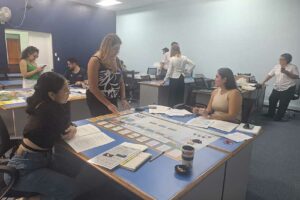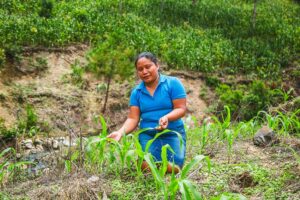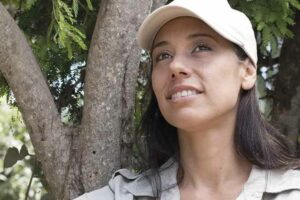CATIE strengthens bee conservation with these three contributions: knowledge, academic networks, and policy
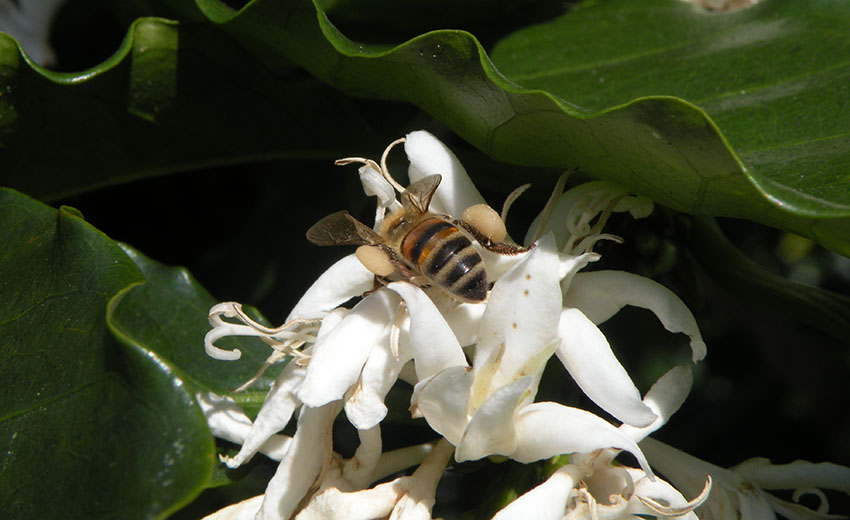
- Protecting pollinators is a challenge that requires the collaboration of all stakeholders in the food chain, from farmers to consumers.
Amid growing concern about the impact of pesticides on pollinating insects, and on the occasion of World Bee Day, CATIE (Tropical Agricultural Research and Higher Education Center) shares some of its contributions from science to promote the conservation of bee communities and the development of sustainable solutions.
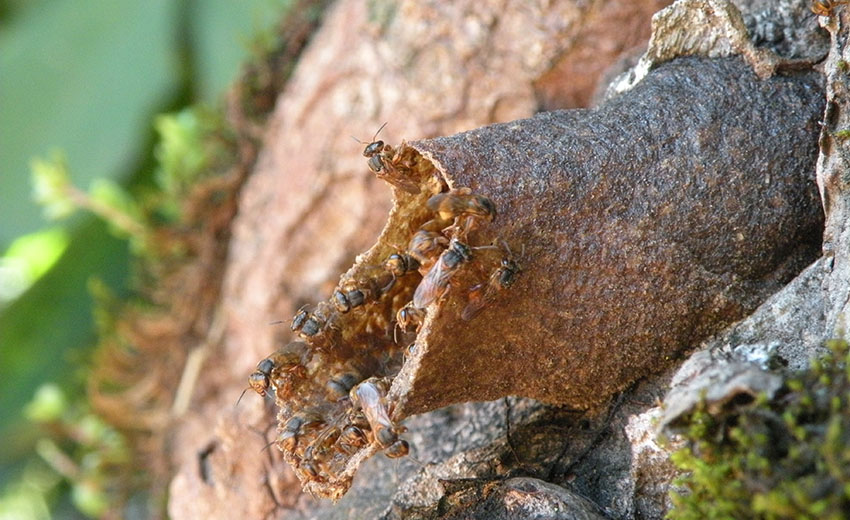
Alejandra Martínez-Salinas, coordinator of the Forests and Biodiversity in Productive Landscapes Unit, warns that the indiscriminate use of pesticides threatens not only domesticated bees but also wild species, which are essential for ecosystem health and food security.
"Unfortunately, much of the focus, especially in the media, is limited to the species Apis mellifera, which is a domesticated species used for honey production (hence the name apiculture and beekeeping). However, the honeybee or European bee, as it is also known, is an introduced species, not native to the Americas, and although they are very important for honey production, we forget that there are hundreds of other species of wild bees about which we know very little and on which we need to expand our research efforts," explained Martínez-Salinas.
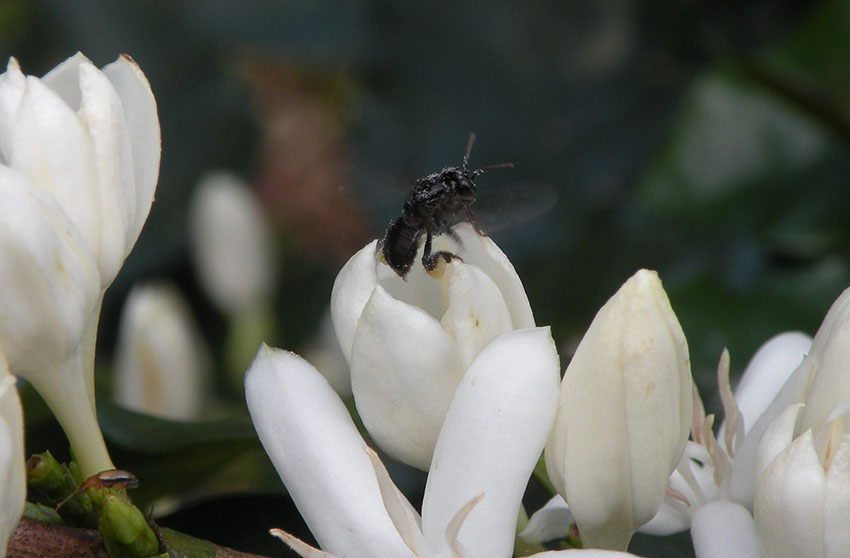
CINAT-UNA (Center for Tropical Beekeeping Research at the National University of Costa Rica) indicates that Costa Rica has registered 650 species of bees, while research by the Forests and Biodiversity in Productive Landscapes Unit on coffee farms reports more than 41 species of wild bees visiting coffee plants during their flowering (data comes from studies solely in Costa Rica).
Martínez-Salinas highlights that pesticide use impacts bees in three main ways: direct mortality from contact with chemicals, indirect mortality by destroying their food sources, and contamination of those food resources. According to Martínez-Salinas.
The root of the problem lies in the lack of information and awareness about the harmful effects of pesticides.
Most farmers apply these products out of agronomic necessity and cultural reasons, without fully considering or understanding the environmental consequences.
"We have to find a balance between how we carry out traditional agronomic practices within a crop and how we avoid harming the organisms that are also providing us a benefit, such as pollination. Applying many chemicals, regardless of whether they are pesticides or herbicides, will have a negative impact on different communities of pollinating insects such as bees, beetles, butterflies, ants, and wasps," Martínez-Salinas added.
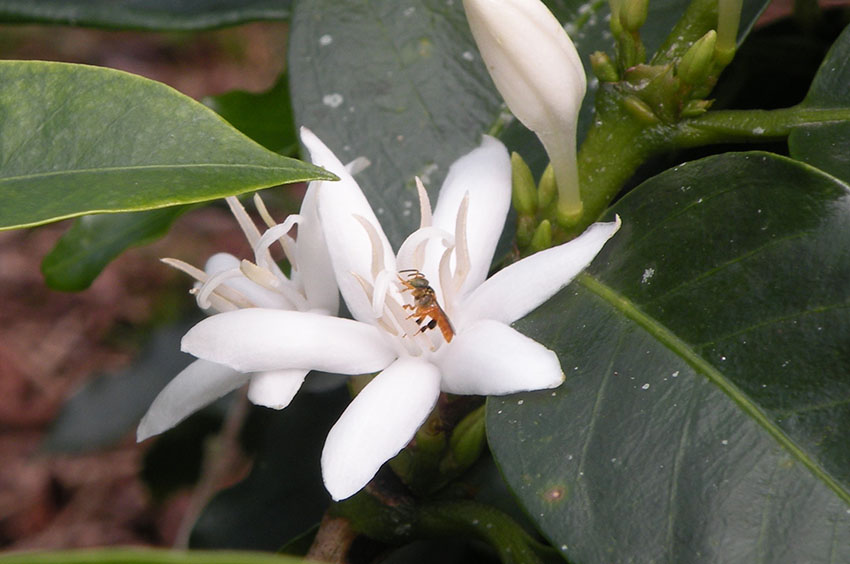
Three important contributions from CATIE:
- Generation of knowledge through applied research.
- Collaboration with academic and extension networks to train producers, especially women, in sustainable coffee practices and environmental education activities for free. For example, collaboration with the organization Bean Voyage within the framework of the project Conserving Neotropical Migratory Birds through Ecosystem Service Management on Coffee Farms, a project led by CATIE.
- The signing of an institutional policy for bee protection in 2022.
Additionally, CATIE celebrates World Bee Day with activities both on its campus and in collaboration with other institutions and shares public educational resources on its social networks.
Finally, CATIE is working on the ecological restoration of areas on its commercial farm, including the planting of melliferous species to improve habitat for pollinating insects, thanks to the contribution of organizations like Bee The Change, a project that includes planting melliferous plants and installing bee hotels to promote year-round availability of food resources and provide suitable spaces for their protection and reproduction.
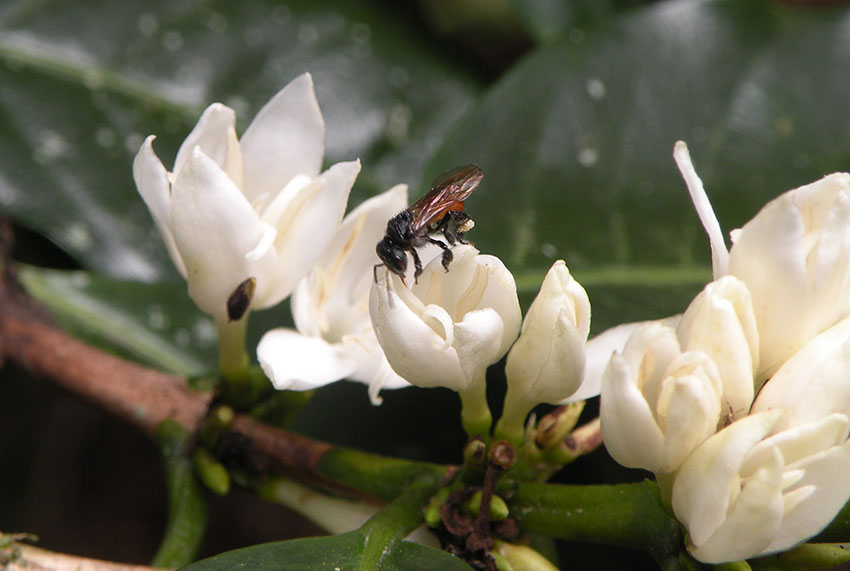
Generation of knowledge
Research conducted by María Fernanda Guanga Guillén on pollinator communities (bees) on the CATIE farm and its surroundings, as well as by Denis Padilla Raudales on bee communities in the Chiquitano forest of Bolivia, has revealed outstanding data on pollinators in different contexts.
Additionally, CATIE leading projects like the one on Conserving Neotropical Migratory Birds, funded by the U.S. Fish and Wildlife Service (USFWS), not only benefit migratory birds but also pollinators, by promoting agricultural practices that harmonize production with environmental conservation.
To access some of the most recent research and publications from CATIE on this topic, you can check the provided links.
Research and Publications
María Fernanda Guanga Guillén, generation 2022-2023, scientific master's in Management and Conservation of Tropical Forests and Biodiversity.
Her research was conducted with pollinator communities (bees) on the CATIE farm and its surroundings, reporting 27 bee species in land uses such as forests, forest plantations, pastures, and sugarcane. She is currently working to publish a research article with her results.
His thesis is available in the institutional repository:
Assessment of bee communities in the main land uses of the CATIE commercial farm
Denis Padilla Raudales, generation 2021-2022, scientific master's in Management and Conservation of Tropical Forests and Biodiversity.
Denis conducted research evaluating pollinator communities (bees) in the Chiquitano forest of Bolivia, with the support of the Foundation for the Conservation of the Chiquitano Dry Forest (FCBC), specifically with the Alta Vista Tropical Dry Forest Study Center (CEBST-AV).
His thesis is available in the institutional repository:
Bee communities (Hymenoptera: Apidae) in contrasting environments of a landscape in the Chiquitanía, Santa Cruz, Bolivia
Eugenio Solís Rodríguez, generation 2012-2013, scientific master's in Management and Conservation of Tropical Forests and Biodiversity.
Eugenio researched bee communities in coffee areas bordering forest patches in the Central Volcanic Range Biological Corridor (CBVCT), and his thesis is available in the institutional repository:
Contribution of an ecological connectivity network to the ecosystem service of pollination in agricultural crops, case study: coffee in the Central Volcanic Range Biological Corridor, Costa Rica
Andrea Garay, Specialist in Sustainable Agribusiness at the Unit of Environmental Economics and Sustainable Agribusiness of CATIE UEAAS/EfD, carried out in 2016.
According to Garay's study, beekeeping represents between 70 and 100% of the economic income of the families that participated in the study, highlighting that it not only provides economic income but also satisfies social and environmental needs.
His thesis is available in the institutional repository:
"Socioeconomic characterization and value chain of the beekeeping sector in the provinces of Puntarenas and Guanacaste as a basis for determining the viability of implementing a financial mechanism to address climate change in Costa Rica"”
Project on Conserving Neotropical Migratory Birds through Ecosystem Service Management on Coffee Farms, with financial support from the U.S. Fish and Wildlife Service (USFWS) through the Neotropical Migratory Bird Conservation Act (NMBCA).
- Why are birds and bees important for coffee productivity?
Open access scientific article in a high-impact journal:
Interacting pest control and pollination services in coffee systems | PNAS
Master's thesis on Biodiversity Conservation Practices by Bruna Amante.
His thesis is available in the institutional repository:
Thesis: Functional connectivity and ecosystem services provided by bees in agro-landscapes of the Central Volcanic Range Biological Corridor, Costa Rica
At this moment, student Julio Aguilera Aguilera is in his home country, El Salvador, working with bee communities in secondary forests and avocado plantations. Julio is a student of the scientific master's in Management and Conservation of Tropical Forests and Biodiversity, a DAAD (German Academic Exchange Service) scholarship recipient, and will also receive support from the Resilient and Biodiverse Landscapes of Northern Mesoamerica project (BLF project), funded by the Department for Environment, Food and Rural Affairs (DEFRA) of the United Kingdom.
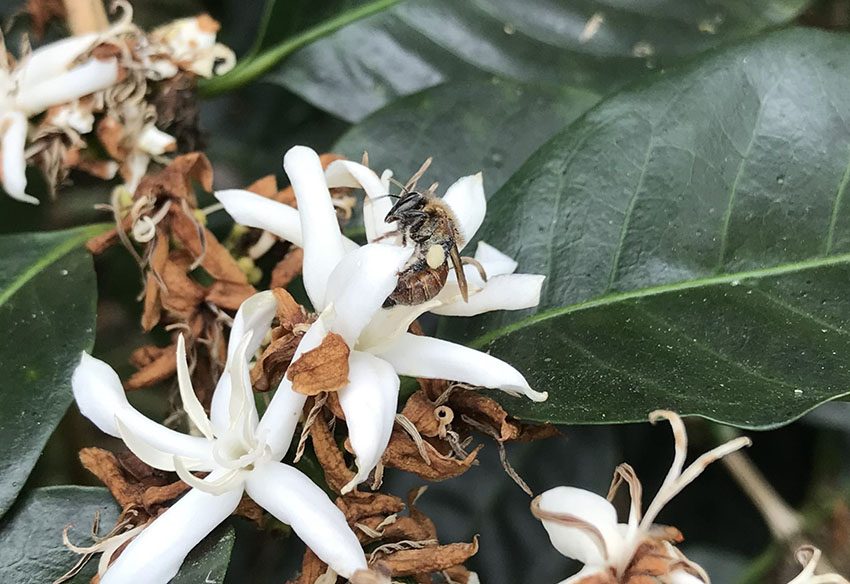
More information:
Alejandra Martínez-Salinas
Coordinator
Forests and Biodiversity in Productive Landscapes Unit
amartinez@catie.ac.cr
Written by:
Esteban Rodríguez Zamora
Communicator
Communications and Marketing Office
esteban.rodriguez@catie.ac.cr

